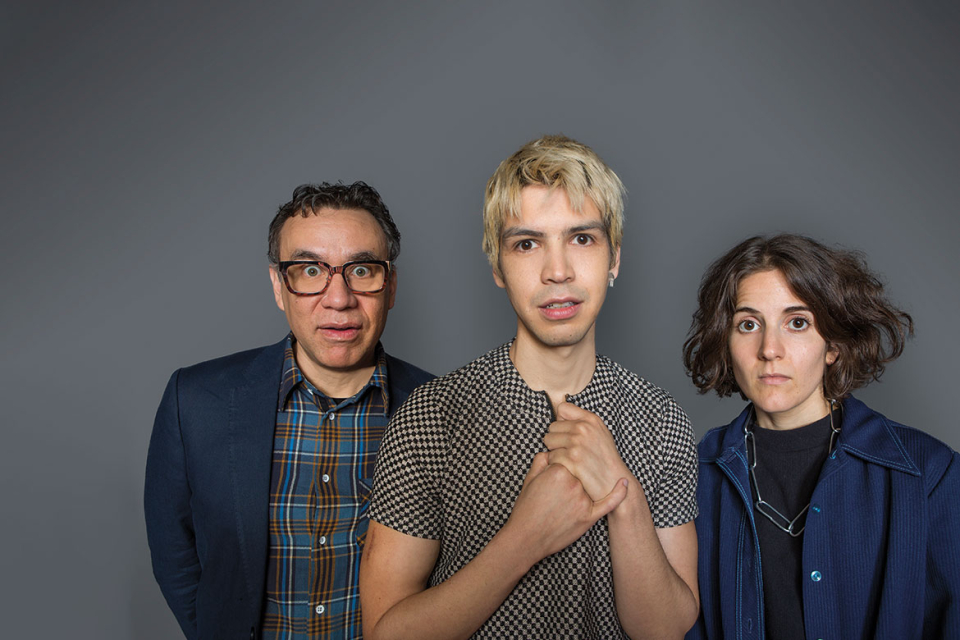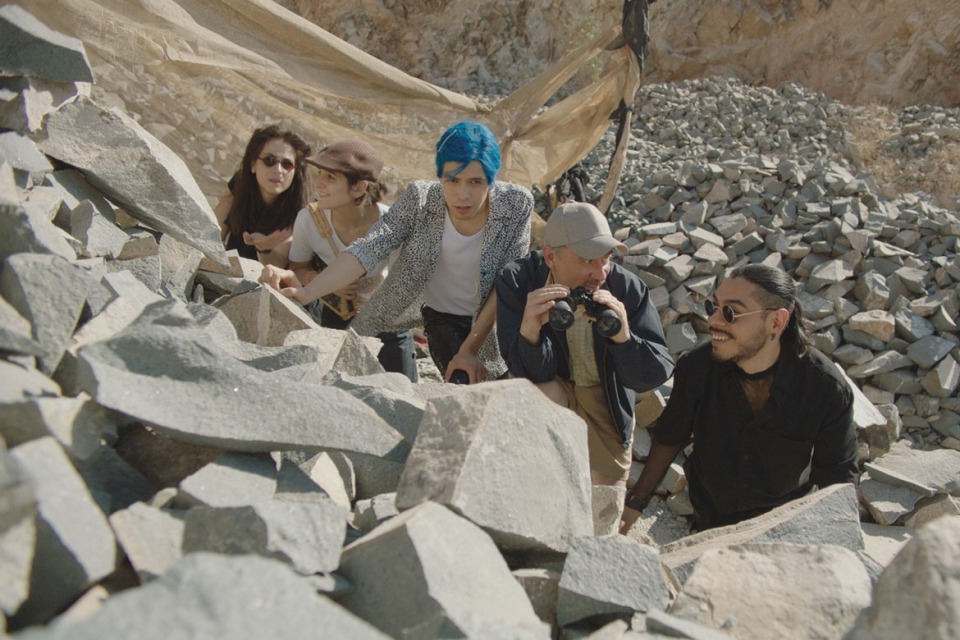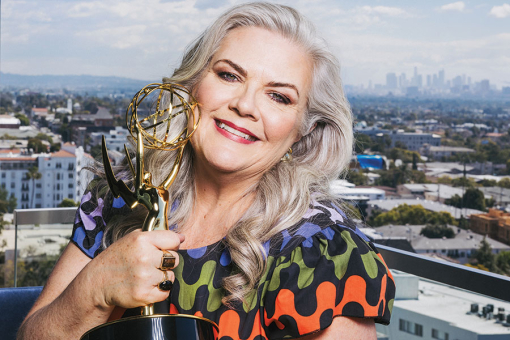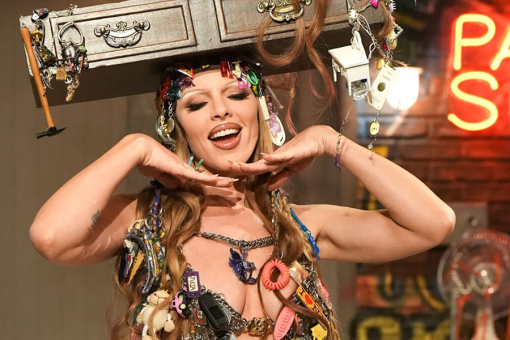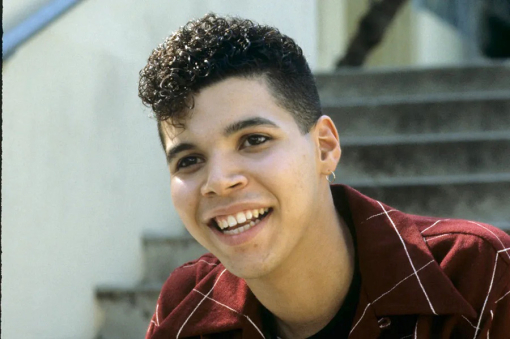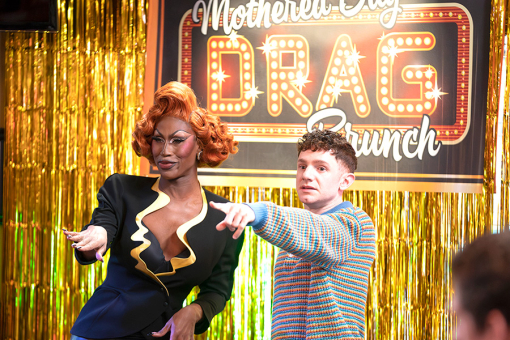If anyone has trouble explaining Los Espookys, they shouldn't feel bad. Even the show's creators and stars admit that it's difficult.
"It's probably easier to relay what the show is by communicating the vibe of it," says Julio Torres, a cocreator, executive producer, writer and costar.
The vibe? "It's like eating a tortilla chip with chocolate and red pepper flakes on top. You're not sure why, but you want to keep eating it," says costar Bernardo Velasco.
So, what do they tell their relatives? "I was just with family in Panama," relates Ana Fabrega, also a cocreator, executive producer, writer and costar — plus a director. "They said, 'What's it about?' And I said, 'It's about a group of friends who do horror.'"
"But what does that mean, do horror?" Fabrego muses. On the hit HBO comedy, it means creating a haunted house to disburse an inheritance, reviving tourism in a sleepy coastal town with fake sea-monster sightings, performing a phony exorcism to pull focus from a rival priest, or staging an ersatz eclipse with flying scenery powered by an exercise bicycle atop a skyscraper.
For Los Espookys, such macabre machinations are all in a day's work.
Set in a fictional Latin American country but shot in Santiago, Chile, the mostly Spanish-language Los Espookys is a gig-comedy about freelance fright-makers. It's a truly odd job, but someone's got to do it.
There's the horror movie–obsessed Renaldo (Velasco), an asexual Goth; his friend Andrés (Torres), a blue-haired, glamorously paranormal heir to a chocolate fortune; Tati (Fabrega), a naïve goof who's game for anything, even marrying Andrés's ex-boyfriend; and her sister Úrsula (Cassandra Ciangherotti), a down-to-earth dental hygienist who knows her way around a set of prosthetic fangs.
"These aren't just friends who love horror," notes blogger Kate Sánchez, host of the But Why Tho? podcast. "They're friends with the skillset to bring it to life."
The whimsical Fred Armisen, whose mother was born in Venezuela, is also a cocreator, executive producer, writer and costar. He plays ever-upbeat Uncle Tico, a preternatural car-lot attendant who "could park before he could speak," but now finds his livelihood threatened by self-driving vehicles.
Season two of Los Espookys, which begins September 16 on HBO and HBO Max, brings new adventures and new guest stars, including Isabella Rossellini; Yalitza Aparicio, an Oscar nominee for Roma; and German singer-songwriter Kim Petras. Also to come: new oddities like a ghostly beauty queen who keeps appearing to Renaldo, a ship's anchor hooked through her midriff.
"Just when you think that the creators can't take it any farther, they come up with a new absurd gig that somehow becomes meaningful and genius," Velasco says.
Absurd and meaningful? Fans just go with it and don't ask too many questions. As a critic from The Atlantic wrote upon the show's 2019 premiere, Los Espookys is "a show whose charms stem from its inexplicability." Or as Greta Titelman, who plays villainous U.S. ambassador Melanie Gibbons, said more recently, "You just have to watch it."
Some fans liken the show to Scooby Doo, Where Are You! — but on edibles.
The Guardian, for instance, called Los Espookys "slyly surreal" and "unlike anything else on television." The New Yorker praised it as "a magic-realist farce" that is "exuberant with hot colors and dry absurdities." Meanwhile, Salon.com said the program is a "candy-colored circus, sprinkled with enough ridiculousness to make each episode a dose of unfiltered happiness."
Such bliss was exactly what Armisen, Torres and Fabrega set out to provide when the idea began germinating with Armisen in 2017.
"It was very important to Fred, going into this project, that it be good-natured," says Amy Gravitt, head of comedy and executive vice-president, programming, for HBO. "He had this idea that only good things happen. There's a real charm to that notion. You're not worried about anyone in this show." Even so, Los Espookys is anything but dull. As Gravitt adds, "They've proven that you can be kind and still be hilarious and unexpected."
The show was not a tough sell at HBO — Torres, a former Saturday Night Live writer, and Fabrega, a veteran of At Home with Amy Sedaris, are hot alternative comedians, and Armisen's starry career has included Saturday Night Live, Portlandia and Documentary Now!
"I had seen Julio's work and Ana's work and, obviously, I knew Fred, and wanted to find something to do with them," Gravitt says. "With the support of Broadway Video" — the production company of SNL creator Lorne Michaels — "it came together quickly."
The creators, in fact, were surprised by just how quickly.
"The show blossomed in front of our eyes and their eyes," Torres says.
The challenge was finding the right actors to play Renaldo and Úrsula. Fernando Frias, one of the show's first-season directors, suggested Velasco, a brooding Mexican stage actor and casting director, for Renaldo. Velasco's teen obsession with Marilyn Manson surfaces in Renaldo's mesh-heavy wardrobe.
For Úrsula, they chose Ciangherotti, a Mexican actress from a large show-business family. Her Colombian father, Fernando Luján, was a Mexican film star, as was her Argentine grandfather, Alejandro Ciangherotti. Her brother, Fernando Ciangherotti, appears in telenovelas. Her character is the voice of reason in the gang, and a constant source of encouragement on-and offscreen.
"We really lucked out," Fabrega says of the castings. "When we all met and got to know each other, they felt like such a fit for the show. They're so kind and sweet and funny and brought so much to the characters. Once we saw how they played them, it really informed the writing."
"When we started writing the second season," she continues, "we just threw out a bunch of things that we think are funny and then we figured out how to make them happen in a way that narratively made sense."
Armisen adds, "It's not just 'anything goes.' We do set some parameters to make it a more cohesive world."
What makes the show cohesive is the tone. That vibe that Torres likes to speak of is somehow both adorable and devilish, DIY and high fashion. The special effects Los Espookys perpetrate, for example, have a whiff of crafts-store hominess about them, while their wardrobes can run toward nonbinary couture.
"They really do create their own world," Gravitt says. "The projects they're trying to pull off are so handmade, but at the same time, the world that Andrés inhabits has a real glamour to it."
Truly, Torres's character dresses like an intergalactic TikTok model, even while wrestling with his inner demon, which, of course, is an actual water demon (Spike Einbinder). He also has one-on-one conversations with the Moon, who, as played by Aparicio, is dressed for Studio 54.
Says Torres: "There's something very joyful about all of it."
That joy was interrupted during the filming of season two in early 2020, when Covid shut down production before the final episodes were finished. Like so many series, Los Espookys went on what seemed like a never-ending hiatus. "Our return date got pushed back like five or six times," Torres says. "At first, it was like, the utterly delusional 'Okay, we'll be back in two weeks.' Then it was, 'Okay, another month.' And then a year and then two years."
"I think we all had this fear that we might never get to finish it," Titelman says.
But the show was never out of mind during quarantine. "Because we created and wrote the show," Torres says, "we were constantly thinking about these characters. Even in the depths of the pandemic, with no end in sight, we were texting, 'Maybe in one episode, he does this or he does that....'"
"We had gotten through probably 60 percent of production before we shut down. There was a feeling of like, 'Oh, we were so close, and now we're going to have to wait two years to finish two episodes and a handful of scenes,'" Fabrega recalls. "But to go back and see the crew be excited to work on it again felt very reinvigorating."
"It felt like a victory over adversity," Ciangherotti says.
But returning to finish episodes they'd begun filming two years earlier made for an odd experience. "Jumping back in was trippy," Titelman says, "because it honestly felt like no time had passed."
"I had a weird moment while I was getting ready to shoot the scene we were shooting right before the production sent us home," Velasco relates. "It was like those two years had been a crazy dream."
As for shooting in Chile, the consensus is that the remote destination is a plus. Not only does it lend the series a distinct look, but as Armisen says, "It's good for us that it's really far away. We have no distractions. There's nothing going on for us but the show."
The real-life friendships they've forged there only enrich what's onscreen, and the creators believe that audiences gravitate to that dynamic. "There's something infectious about seeing a group of friends who enjoy each other but who have no need to be with each other," Torres says. "Unlike a real family or a workplace, where they're stuck with each other, they're just drawn to each other on Los Espookys."
The characters' individual "otherness" leads them to togetherness, it turns out, which may be one reason that Los Espookys has found some of its most ardent fans in the queer community. Though the creators say they have no agenda, there's something in Los Espookys for every letter in the LGBTQIA+ acronym. That was more a byproduct than a goal.
"It's just about making work that's authentic to the people who are making it," Torres says. "If you allow different kinds of people to make what's in them, that'll come about organically. This show is honest to who we are, and who we are is an odd multitude of things."
Ultimately, that may be the best way to explain Los Espookys.
Tati can be both dense and delightful, or, as Fabrega says, "Stupid, but smart in her own way." She may think she's writing her own original novels by transcribing audiobooks, for instance, and she may dream of being Cirque du Soleil — not a part of the show but the whole thing, right down to the ticket-takers — but she's also an important, cherished member of the group.
Andrés can be utterly self-absorbed and yet a good friend when he needs to be. "I like temperamental people," Torres admits.
As for Renaldo, he can be asexual and still be sexy — particularly to that dead pageant contestant who keeps haunting him.
Unexpectedly, that queer — in all senses of the word — authenticity has garnered Los Espookys a wider audience than Torres and Fabrega ever imagined. "I initially thought it would be fans of niche comedy. But then I have had people tell me, 'My brother who works in finance loves the show.' I wouldn't have expected that, but cool," Fabrega says.
Torres adds, "I love it when I'm walking down the street in New York and really gruff guys, who otherwise I would never engage with, go, 'Los Espookys! I love it!'"
Will these friends and their dog, Frutsi, not to mention Tio Tico, have further adventures? "It could be a year," Torres teases. "It could be five years, it could be ten years, it could be never, or it could be tomorrow."
Like everything else on Los Espookys, it's a mystery.
Besides Fred Armisen, Ana Fabrega and Julio Torres, the executive producers of Los Espookys include Lorne Michaels as well as Broadway Video's Andrew Singer and Alice Mathias. It is produced by Broadway Video, Antigravico and Fabula, a Chilean production company.
This article originally appeared in emmy magazine issue #10, 2022, under the title, "Fright Club."

